- Home
- Sherwood Smith
The Phoenix in Flight Page 3
The Phoenix in Flight Read online
Page 3
He’d had lots of time to study his yachting charts on the way to Paradisum. There’s an excursion of the Rift between here and there. A difficult jaunt like that, through the chaotic conditions of the Rift, would give him the advantage he needed, and the ParcelNet next-skip algorithms would now be scanning outbound ship routes for the first-destination closest to Qoholeth. If he filed a flight plan to Qoholeth, requesting the first possible departure, the ParcelNet would automatically jump his liftoff to the top if he was willing to take cargo. Good thing I kept my ParcelNet bond current!
Suomo flexed his wrist to bring his boswell back on. He filed the flight plan, and started for the docks, flexing up his lover. (Eduor, I have the most diverting idea...)
A few hours later, Suomo was even more delighted when his pilot confirmed that the DataNet upload to the ship’s cryptobanks after he’d filed their destination had been tagged with a request from the ParcelNet dispatch system to carry a pallet to Qoholeth. The briefly renewed connection with the attractive Rifter stirred his groin to life momentarily—She’ll never know that I got her package there a lot faster than she expected—but even more satisfying was the fact that his gambit had paid off: accepting would now give him priority liftoff from Paradisum. At Qoholeth, he and Eduor would be waiting impatiently for Tani. He might even win not just the race but the alliance that would make his future secure.
Life was so good for the quick-witted!
o0o
DOL’JHAR
Morrighon shuffled with care into the half-circle inlaid in the corridor outside the door to the Commons and braced himself with his hands on either side of the doorframe. The floor seemed to drop out beneath him as the gravitors cancelled a portion of Dol’jhar’s brutal gravity and a quarter of his weight leaked away. The door slid open and he stepped through. His breath eased along with the ache of his twisted frame; for that one moment he could imagine he was again on distant Bori, the planet of his birth.
His spirits lightened, too, despite the fact that he was less safe here among his fellow Catennach bureaucrats than among the vengeful Dol’jharians they served. He’d learned early that safety was a relative thing, and the Commons satisfied the Bori preference for crowded, noisy spaces that even the merciless Catennach training and more than twenty years of exile could not fully expunge. He allowed himself to enjoy the emotion without relaxing the foolish, placatory grin he wore as armor, and made his way toward the food dispensers in the far wall.
Here, deep within Hroth D’Ocha, the tower fortress of Jerrode Eusabian, Lord of Vengeance, there was little to remind one of Dol’jhar; the shuddering smash of the growing storm outside was barely discernible. The low-ceilinged room, its walls and ceiling a riot of colorful murals, was a hive of activity, awash in human noise and tantalizing aromas—the Catennach did not stint themselves for food, sharing in the largesse of the lords’ kitchens, albeit without servants.
The tables were crowded with Bori in service gray, eating and talking and gesturing with careful animation, intensely aware of each other’s personal space. At the far side of the room, oblivious to the noise around them, individuals hunched tensely over consoles that laved their faces with the changing colors of the unending game, Vox Populi, fingers occasionally stabbing at inset keypads. Here and there conversation pods held small groups of Bori—these were all high-status Catennach, relaxing into comfortable chairs and deceptively desultory conversations.
Morrighon lingered over his selections so he could sort the conversations that he would not be invited to join. Heard most frequently were the names Barrodagh and Thuriol.
Morrighon suppressed a shudder. Not far from here, Thuriol was enduring a very different conversation, from which only death would release him, and then far too late. He’d made the mistake of underestimating the unique mastery of both vision and detail that had made Barrodagh supreme among the Catennach, and so far, indispensable to the Lord of Vengeance.
Morrighon showed no sign of the spark of satisfaction burning deep in his belly. Underestimation can cut two ways.
Morrighon loaded his tray with dishes chosen to display a lack of imagination and an abhorrence of variety, and made his way toward a half-empty table where other low-status bureaucrats like himself were seated.
“Morrighon! A moment of your valuable time!”
More awkwardly than necessary, making the dinnerware clatter on his tray, Morrighon turned and approached the conversation pod from which Almanor, a senior Catennach, had addressed him. Surrounded by her cronies, who all wore the same uniform as Morrighon’s wrinkled tunic, but flawlessly tailored, the senior Catennach lazily waved him closer, her malicious amusement mirrored by the others.
Time for sport, Morrighon thought.
“We’ve been discussing the lamentable misstep of our former colleague.” Almanor gestured at the multiple communicators weighing down Morrighon’s belt. “I thought that someone so well in touch as you might have some insights to share.” She paused expectantly.
Morrighon adopted an expression of vapid cogitation that he knew was intensified by his wall-eyed gaze, which made it impossible for others to tell where his attention lay. The tray’s weight was already paining his shoulders, which had never recovered from the long-ago fall in Dol’jharian gravity; the resultant lumpy, misshapen body often made him the butt of jokes.
As now. There was no place for a food tray in the conversation pod, and his status would forbid him to put it down among the senior Catennach, anyway. So, as Almanor intended, he had to stand there in increasing discomfort.
“I haven’t heard very much, senz-lo Almanor,” he replied, using the Dol’jharian inferior-to-superior title as was appropriate and expected. He tightened his throat as he spoke, knowing that would accentuate the whine that others heard even in his most relaxed speech.
“Oh, I’m sure you hear quite a lot,” said another, his tone implying the unlikelihood of any understanding arising from whatever information might come to Morrighon.
“But?” said Almanor.
Morrighon was saved from further mockery by a soft tone from one of his coms. The devices were designed to force vulnerable acoustic communications on lower-status Catennach, so in public Morrighon, like others in his position, used them mostly to signal alerts from his work console. He found it useful to carry several tuned to different channels, both because it tended to confuse eavesdroppers and also because it made him look ridiculous.
“Your pardon, senz-lo Almanor. I am summoned by senx-lo Barrodagh.” In actuality, the alert was from the Paradisum channel he’d set up, but he judged that important enough to mandate an in-person report to Barrodagh, a costly gesture that would reinforce the persona he was building.
Almanor sat back, her eyes narrowing slightly. “Ahh, Morrighon, scurry, scurry, scurry, eh?” She waved a hand negligently. “I’m sure you’ll have occasion to visit me soon, and we can continue our discussion then, yes? Off with you then.”
Status determined who went to whom among the Catennach. Morrighon knew that Almanor enjoyed forcing him to traverse the high-gee corridors of the fortress on meaningless errands. Morrighon also knew, but never, ever let it show, that this was a sign of insecurity, of someone who had forgotten that among the Catennach there was no room for indulgence of any kind. He was sure that Barrodagh had never indulged in petty cruelties on his long climb to supremacy—they were a waste of time and a distraction from the quest for power.
Morrighon bowed wordlessly and took his tray over to the disposer, where he shoved it through the hatch. His stomach griped with hunger, but having, by dint of long and subtle effort, brought himself to Barrodagh’s attention, he dared not vary from the rigid adherence to routine that Barrodagh had come to expect from him.
His future depended on it.
o0o
Barrodagh leaned back in his chair and inhaled the warm scents of jumari and arrissa that filled the room, trying in vain to ignore the shrill whine of the storm outside the triple-dypla
st window. The incessant sound felt like a merciless grip on his neck, and a blinding point of pain was slowly growing behind his eyes. A change in the wind caught savagely at Hroth D’ocha, and the Bori’s stomach clenched again as the gravitors gracelessly damped the swaying of the tower. They easily kept the gravity in Barrodagh’s office at Bori’s gentler pull, but they were too crude to compensate well for sideways acceleration.
He pressed his fingers into his neck and stretched, trying to savor the soft air of a summer night on distant Bori, barely remembered from his childhood, but the chill of a Dol’jharian spring trickled through the window as the stink of ozone slowly grew.
The conditioners are overloading again. Barrodagh swiveled himself away from his desk to face the opaqued window. He glared at the large deep-set pane, now counterfeiting the phosphorescent beach at Aluwor on Bori. Its frame vibrated under another blow from the wind, and he slapped the window switch. Why couldn’t the Dol’jharians pour or print their buildings like everyone else, instead of fitting them loosely together out of wood and stone, like an Ur-bedamned puzzle, just because it had always been done that way?
The window cleared slowly, becoming a deep sill backed by a featureless gray that nevertheless gave an impression of rapid movement and intense cold. Barrodagh’s reflection stared back at him, colorless and ghostlike. Dark hair, pale eyes, pale skin; the Bori ignored these, hating the wind, the cold, and the planet that spawned them.
The gray shroud outside thinned and whipped away, and the window flared savagely bright as glaring blue-white sunlight broke through the storm. Barrodagh gasped and squeezed his tear-flooded eyes shut, groping for the window control. The pane dimmed too slowly—The damned window must be all of five hundred years old, he thought angrily—but finally he could see again and looked out over the white, thaw-splotched expanse of the Demmoth Ghyri, the high plateau of the Kingdom of Vengeance.
He was the second most powerful man on Dol’jhar, more powerful than any of the so-called Pure Blood save the Lord of Vengeance himself, whom he had served for nearly twenty years; but the view of Dol’jhar’s bleak landscape was a constant reminder that the least of those arrogant Dol’jharians could withstand conditions that would kill him quickly.
Barrodagh opaqued the window and turned his back on it. Power was his, for through him went out the commands of Jerrode Eusabian, Avatar of Dol, Lord of Vengeance and the Kingdoms of Dol’jhar. The Pure Blood may disdain me, but they obey, for who is to know which commands are Eusabian’s and which are mine?
A soft tone sounded from his desk, rather than the modern console to one side that he used for all Catennach communications, and Barrodagh seated himself hastily before he touched the ruby point glowing in its dark, glassy surface. Only Dol’jharian nobles used the old comm system, disdaining the Bori system as beneath their dignity.
Barrodagh tapped his knuckles on the desk as it slowly extruded the vidplate from a slot at the back. The screen flickered with a nauseating swirl of greenish-gray light as the electronics struggled to resolve an image. Damned antique, thought Barrodagh, thoroughly irritated by the almost continuous queasiness induced by the grav-damped swaying of the tower. And damned Dol’jharians, too: if it suited their ancestors, it suited them, unless, of course, it was good for killing people or inflicting pain—then only the best and newest would do.
The vidplate finally came to life and Barrodagh recognized the angular, arrogant features of Evodh, Lord Eusabian’s personal pesz mas’hadni.
“Serach Barrodagh.” Evodh’s voice was coldly formal, with no trace of the obsequiousness Barrodagh was used to hearing. The claws and eyes of the karra-patterns lacquered on his skull gleamed dully as the Dol’jharian physician looked at him with a trace of disdain. He had used the “presumed equal” mode of address, an exquisitely-shaded insult that was as close to civility as a Dol’jharian noble ever came in speaking to a Bori.
Barrodagh inclined his head and did not speak, as was fitting, but his mind was awash with pleasurable surmise. Observing Thuriol’s first session in the mindripper had been an intensely satisfying, albeit vicarious, revenge on his long-time rival, even though he had not been permitted to remain after the first time Thuriol lost consciousness. It had been enough that his rival had known he was there, had seen him watching... while he still had attention to spare for anything but Evodh’s expert torment.
“I received your request to attend my next session with the Catennach Thuriol,” said Evodh. “There is not to be a next one.”
Barrodagh heard the faint emphases on each occurrence of the word “next” and knew them to a subtle warning that his request, even as carefully phrased as it had been, had come perilously close to offending the Dol’jharian noble’s pride. He lowered his eyes as Evodh continued.
“I extracted everything that might bear on the Avatar’s paliach and, as the subject’s transfiguration was for information, not for honor, I have terminated it.”
Evodh smiled thinly and Barrodagh realized that he was failing to conceal his disappointment that Thuriol had met death so soon. He schooled his face back into the noncommittal mask that had kept him alive for so long and said nothing.
The physician continued after a brief pause. “Do you want the head for your paliachee?” His sneering emphasis on the Dol’jharian word for the formal trophy nobles took from fallen rivals brought Barrodagh’s head up in a quickly controlled motion of protest at the insult.
Acid rage clawed Barrodagh at the physician’s pleasure in thwarting him. But Evodh was powerful, and Dol’jharian nobles were not to be trifled with, especially one whose title indicated his mastery of pain in all its intensities and forms.
A child’s paliach, he thought. That’s how he sees my vengeance. Well, he would lose no more face in this particular encounter. He inclined his head again briefly, and forced his voice to a quiet monotone. “No, pesz-ko Evodh.” He used the term that indicated the least possible difference in rank between them, which was the closest to insult that any Bori dared come when speaking to a noble of Dol’jhar. “You may do with it as you please.”
Evodh blanked the connection.
Barrodagh slammed his fists down on the desk and shot to his feet. Damn him! Damn them all!
The vidplate chose that moment to jam in its slot, and the ancient mechanism emitted a jeering squeal as it struggled to retract the screen. Barrodagh lunged savagely across the desk and grabbed the vidplate, wanting desperately to break something, but it jerked from his grasp and sucked his fingers into the slot with bruising force, leaving him sprawled across the desk in a welter of flimsies and record chips.
Barrodagh yanked his fingers out of the slot and levered himself back to his feet, quivering with rage. Another fierce blast of wind caught at the tower so savagely that the blanked-out window flickered. His stomach lurched, a bubble of acid burning the back of his throat.
He took a deep breath, then another, forcing himself to relax. His momentary loss of control was a warning that the extra work he’d taken on when Thuriol fell was taxing his endurance. He could not afford such a display, not even here in the privacy of his office. Thuriol is dead. His last real rival. I should take the time to enjoy that.
The door tone sounded, and a window popped up on his console, revealing the ugly face of Morrighon, the factotum he’d assigned to track the Heart of Kronos. Barrodagh swiftly tidied the desk, then touched the door control on his desk.
The door slid open. Morrighon bobbed in a partial bow, smiling foolishly as the communicators hanging from his belt clattered together. Then he limped crabwise across the suite to stand before the desk, where he bowed again, clatter-clatter, and stood waiting expectantly, ugly and misshapen. Barrodagh supposed Morrighon’s eyes were carefully averted as appropriate, but the man’s wall-eyed gaze made it impossible to tell where he was looking.
Morrighon bowed yet again when Barrodagh nodded for him to speak. “Senz-lo Barrodagh,” he whined, “our observer at the Paradisum Terminal repor
ts that the Heart of Kronos has been dispatched via ParcelNet. Approximately 30 days to the Qoholeth Anachronics Hub.” He touched one of the communicators at his belt. “As instructed, I have relayed the full communication to your queue. There are no en clair copies elsewhere.”
Barrodagh eyed his subordinate, whose personal delivery of this news again confirmed his judgment. A safe tool—careful, predictable, not too ambitious, and utterly unacceptable to a Dol’jharian lord. A Dol’jharian so deformed would have been exposed at birth. Morrighon’s twisted body was due to imperfectly-healed shattered bones, but he would nonetheless be despised by the Lords. Morrighon had no future save through Barrodagh. Perhaps he should be assigned some of Thuriol’s work.
“Very well. Your diligence is noted. You may dispense with further in-person reports unless otherwise instructed.”
Morrighon’s ugly mouth gaped with gratitude, reminding Barrodagh of a fish; he bowed again, more deeply than before, and departed.
Morrighon’s pathetic gratitude banished the last traces of Barrodagh’s anger, and even his nausea at the swaying of the tower was now merely a minor distraction. The last movement of his lord’s paliach—the formal vengeance that would wipe away the stain of his defeat at Panarchist hands twenty years ago—was beginning, timed with an exquisite precision denied to his enemy by the rigors of space-time. But not to us.
Within a day of the Heart reaching the carefully-cultivated traitor at the Qoholeth Anachronics Hub—whose usefulness would then be at an end—it would be in Dol’jharian hands. Around the same time—a few days before or after didn’t matter, given the spacetime delays of Panarchist communications—Eusabian’s forces would strike simultaneously throughout the Thousand Suns, killing the Panarch’s three sons, capturing the Panarch and his Privy Council, and unleashing their Rifter allies throughout Panarchic space.

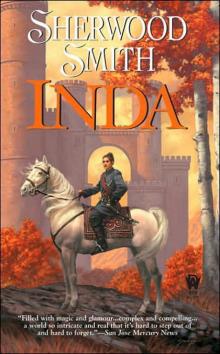 Inda
Inda Danse De La Folie
Danse De La Folie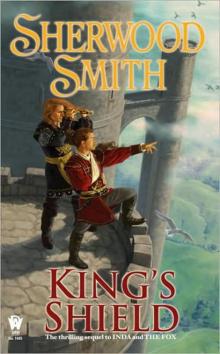 King's Shield
King's Shield Whispered Magics
Whispered Magics Fleeing Peace
Fleeing Peace Barefoot Pirate
Barefoot Pirate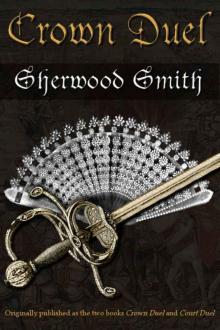 Crown Duel
Crown Duel Mearsies Heili Bounces Back
Mearsies Heili Bounces Back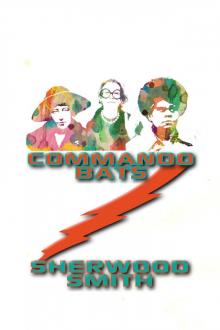 Commando Bats
Commando Bats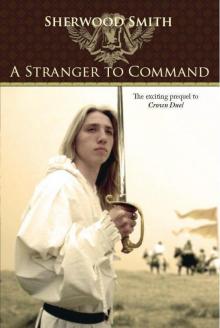 A Stranger to Command
A Stranger to Command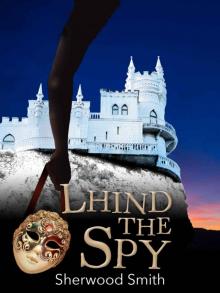 Lhind the Spy
Lhind the Spy The Spy Princess
The Spy Princess Blood Spirits
Blood Spirits Sasharia en Garde
Sasharia en Garde Lhind the Thief
Lhind the Thief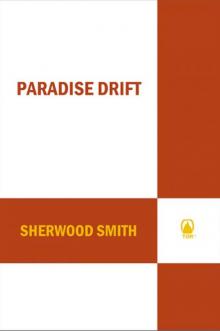 Paradise Drift
Paradise Drift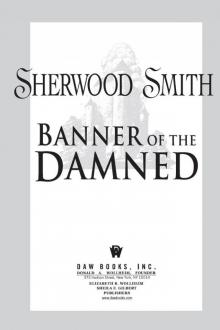 Banner of the Damned
Banner of the Damned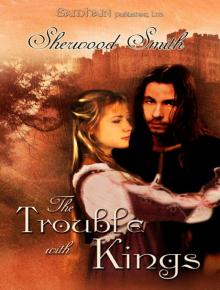 The Trouble With Kings
The Trouble With Kings Poor World
Poor World Treason's Shore
Treason's Shore Wren Journeymage
Wren Journeymage A Posse of Princesses
A Posse of Princesses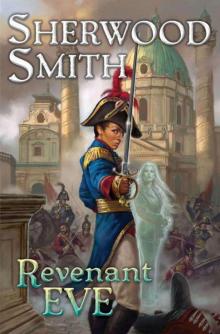 Revenant Eve
Revenant Eve Once a Princess
Once a Princess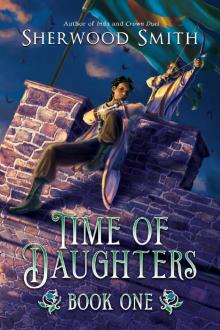 Time of Daughters I
Time of Daughters I Rondo Allegro
Rondo Allegro Coronets and Steel
Coronets and Steel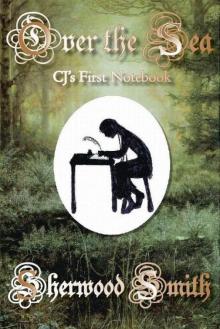 Over the Sea
Over the Sea Senrid
Senrid Hunt Across Worlds
Hunt Across Worlds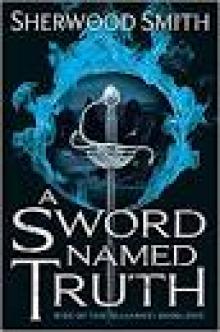 A Sword Named Truth
A Sword Named Truth The Fox
The Fox Twice a Prince
Twice a Prince Fair Winds and Homeward Sail: Sophy Croft's Story
Fair Winds and Homeward Sail: Sophy Croft's Story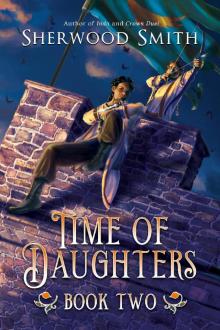 Time of Daughters II
Time of Daughters II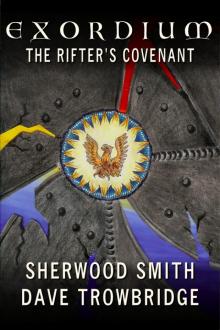 The Rifter's Covenant
The Rifter's Covenant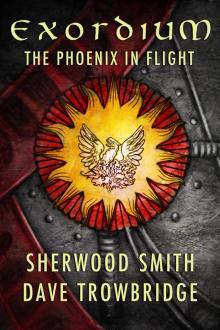 The Phoenix in Flight
The Phoenix in Flight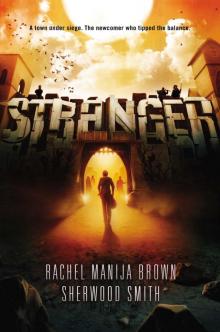 Stranger
Stranger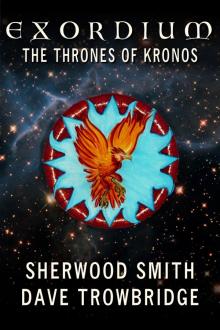 The Thrones of Kronos
The Thrones of Kronos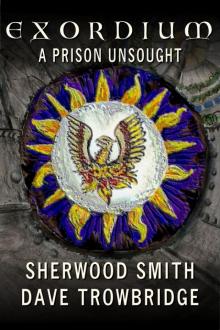 A Prison Unsought
A Prison Unsought Twice a Prince: Sasharia En Garde Book 2
Twice a Prince: Sasharia En Garde Book 2